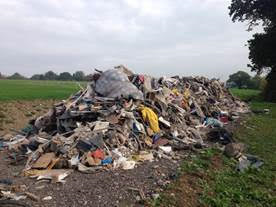The cost of rural crime hit £44.5m in 2017, the highest for four years, according to rural insurer NFU Mutual.
Up 13.4% on 2016 figures, last year’s rural crime wave is recorded in NFU Mutual’s annual Rural Crime Report, which was published at the start of August and shows the level of crime against farming rising as its fastest rate since 2010.
“Across the UK, the cost of rural crime has risen most sharply in Wales, up 41% on the previous year,” the NFU Mutual report states, “followed by the Midlands which is up 32%, while the South East has seen a rise of 30%. The cost of rural theft in Scotland has fallen 3.8%, while the North East is the only English region showing a fall, down 6.5%.”
The report reveals that farmers are putting up earth banks, dry ditches, stockade fences and high-security single access points to fortify their farms against criminals who use 4 x 4 vehicles to get onto farm land to commit crimes and evade police. Protective animals such as geese, llamas, and dogs are being used to provide a useful low-tech alarm system, much as they did hundreds of years ago.
“Faced with repeated and determined attacks from a new breed of brazen thieves, farmers and country people are turning to history books to re-purpose security measures from medieval times,” says Tim Price, Rural Affairs Specialist at NFU Mutual.
“Adapting centuries-old security with high tech solutions is already proving successful in keeping at bay thieves who don’t fear being caught on camera and have the skills to overcome electronic security systems.”
Farmers are also using hi-tech tracking devices and immobilisers on vehicles, CCTV video, dashcams, motion sensors, infra-red surveillance and SmartWater marking in their farmyards and even DNA markers to protect sheep from rustlers.
The report has also found that limited police resources and repeat attacks are the biggest fears for people in rural communities, with many forced to change the way they live and work as a result of rural crime.
“With police facing huge challenges – including budget cuts and extra workload – forces are finding it hard to resource rural policing and this may be one of the reasons for the rise in thefts we are seeing,” says Price.
“However social media is fast becoming the new eyes and ears of the countryside, strengthening the community ties that help in the reporting and recording of crime and bringing thieves to justice.”
The NFU hosted a rural crime roundtable meeting on 8 August where government officials, police and farmers came together to discuss solutions to help tackle the increasing levels of crime in the countryside.
The cross-party meeting dealt with the issues farmers and rural businesses are facing and created an opportunity to discuss practical solutions that police and government can look to address.
The NFU continues to call for a consistent and co-ordinated approach between government departments. Representatives from the Home Office and Ministry of Justice heard directly from farmers about the impacts crime has on their businesses.
“The meeting was a fantastic opportunity to get high-ranking civil servants and police leads on rural crime into a room to work on practical solutions that can deliver for rural communities,” says NFU Deputy President, Guy Smith.
“It represents the first step in a permanent cross-government rural crime taskforce being formed, something we’ve called for in our Combatting Rural Crime report. We will continue to work towards that goal so that rural crime is consistently on the government agenda.
“It is vitally important that decision-makers hear first-hand from farmers about the devastating impacts crime can have on their businesses. Whether it is theft, hare coursing or fly-tipping, the effects can be long-lasting and can severely disrupt a farming business.
“As new figures show, the cost of rural crime is at its highest in years and the NFU will continue to work with MPs, Government and the police to tackle this blight on our countryside.”
The NFU has also launched a Rural Crime Reporting Line in partnership with Crimestoppers. The line allows farmers to anonymously give information about large-scale industrial fly-tipping, hare coursing, machinery theft and livestock theft by calling 0800 783 0137 or visiting www.ruralcrimereportingline.uk


